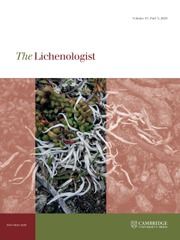Article contents
Two New Asian Xanthoria Species (Teloschistaceae, Lichenized Ascomycotina)*
Published online by Cambridge University Press: 28 March 2007
Abstract
Two corticolous species of the lichen genus Xanthoria, X. alfredi S. Kondratyuk & Poelt from Russian and Chinese Far East and X. aphrodites Kalb, Poelt & S. Kondratyuk from Cyprus are described. Morphological characters, in particular the presence of true rhizines within Xanthoria and their differences from hapters are indicated. Xanthoria novozelandica Hillmann is the first species of Xanthoria in which oil paraphyses have been found. A key to the treated species, including X. novozelandica and Xanthoria sp. from western North America is provided. The ecology and distribution of described species are discussed. Xanthoria alfredi and X. ulophyllodes probably constitute a typical species pair; X. alfredi and X. aphrodites are relict endemics.
- Type
- Research Article
- Information
- Copyright
- Copyright © British Lichen Society 1997
Footnotes
Deceased.
Sadly this is probably one of the last papers to which Prof. J. Poelt has provided a contribution. The first author would like to dedicate this article to the memory of Prof. J. Poelt, a famous botanist of our century and one of the most generous and kindest persons.
References
* Sadly this is probably one of the last papers to which Prof. J. Poelt has provided a contribution. The first author would like to dedicate this article to the memory of Prof. J. Poelt, a famous botanist of our century and one of the most generous and kindest persons.
- 12
- Cited by


